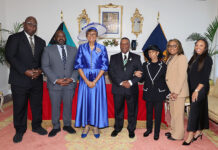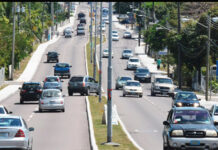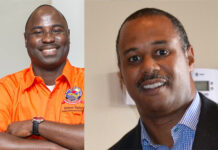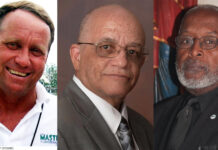Ambassador Sue Cobb, (former U.S. Ambassador to Kingston), Ambassador Mary M. Ourisman, U.S. Embassy Bridgetown, Barbados, Ambassador David M. Robinson, U.S. Embassy Georgetown, Guyana, Charge’ d’Affaires Dr. D. Brent Hardt, U.S. Embassy Nassau, Charge’ d’Affaires Roger Bullen, U.S. Embassy Santo Domingo, The Dominican Republic, (in front) Ambassador Brenda Lagrange Johnson, U.S. Embassy Kingston, Jamaica.
Kingston, Jamaica – U. S. Chargé d’Affaires Dr. D. Brent Hardt attended the 6th Annual Chiefs of Mission Conference on HIV/AIDS, held in Kingston, Jamaica, October 2 – 5. The 4th annual conference was hosted in The Bahamas in 2005.
This year’s conference, organized by U.S. Embassy Kingston, USAID, and the Centers for Disease Control’s Caribbean Regional Program, addressed the theme: “The role of Regional Cooperation in Fighting HIV/AIDS in the Caribbean.” U.S. Ambassadors and Chiefs of Missions from The Bahamas, Barbados, Belize, Trinidad and Tobago, Guyana, Jamaica, Cuba, Suriname, and the Dominican Republic participated, along with experts and activists from across the Caribbean region. The conference provided American Chiefs of Mission in the Caribbean with an overview of successes and lessons learned in supporting HIV/AIDS efforts in the region, while allowing conference participants to share perspectives on how Ambassadors could best use their leadership roles to advocate a continued focus on the disease within their respective host countries.
Prime Minister of Jamaica Bruce Golding delivered the opening remarks, calling for people to “..desist with this foolish notion that sexual awareness is something we should hide from our children and that they must become adults before we introduce them to topics having to do with sexuality,” . He stated that only with strong support from parents and schools, and cooperation from the community, would the topic of HIV/AIDS education and the issue of new HIV/AIDS infections be successfully addressed. Keynote speaker at the opening session was Dr. Robert Gallo, pioneer in the field of human retrovirology and Director of the Human Virology Institute at the University of Maryland. Dr. Gallo and his colleagues discovered that HIV was a retrovirus and developed the life saving HIV blood test. Dr. Gallo traced the origins of the disease and explained the various approaches of those that are working on a HIV vaccine. He emphasized the importance of balancing research needs with social education. Dr. Peter Figueroa, chief of Epidemiology and AIDS in Jamaica’s Ministry of Health and Environment discussed the importance of strategic long-term planning, and strengthening and increasing organization among regional bodies. He estimated that only half of the people infected know their status and that it is important for governments to be engaged in a multi-sectoral response to combat the disease. Juliette Bynoe-Sutherland, Executive Director, AIDS Foundation of Barbados Inc., outlined the unique role the private sector can play, not only in fundraising but more importantly in educating their employees, and providing a supportive environment for those that are infected.
Dr. Hardt moderated a session on “Combating Stigma and Discrimination against people living with HIV/AIDS.” Panelist Rosemarie Stone, author of, “No Stone Unturned,” shared her personal experience of caring for her husband, Dr. Carl Stone who died of complications from AIDS in 1993, and of realizing and dealing with her own HIV positive status. Mr. Ainsley Reid, Program Officer, of the Caribbean Conference of Churches based in Jamaica spoke of the important role that churches and other faith-based organizations can have in combating stigma and discrimination. Dr. Kwame Boafo, Director, UNESCO Cluster Office for the Caribbean based in Jamaica spoke about the role of education and the challenges that arise in trying to combat stigma and discrimination.
Dr. Hardt concluded with a discussion entitled, “Development and implementation of anti-stigma policies to protect people living with HIV & AIDS”. He highlighted the impressive strides The Bahamas has made in combating HIV/AIDS and caring for people living with HIV/AIDS (PLWHA). He recognized the outstanding work and dedication by Dr. Perry Gomez, Director, National HIV/AIDS Program and his staff, as well as local NGOs such as the AIDS Foundation in working to improve the standard of care and quality of life for PLWHA.
Dr. Hardt emphasized that the issue of stigma and discrimination is vital to any discussion about HIV/AIDS. It discourages people from getting tested, discourages discussion and discourages people from being willing to publicly (or privately) support PLWHA. “While many diseases can invade our bodies, HIV/AIDS is unique in the debilitating impact it can have on how a person is viewed by their employers, colleagues, family and friends. You don’t lose your job when people hear you have cancer. Your neighbors don’t gossip and stop inviting you to their home when you have diabetes. Your loved ones aren’t scared to touch you when you have heart disease. But all of these things happen to people living with HIV/AIDS on a daily basis in our countries,” said Dr, Hardt.
Dr. Hardt noted that the U.S. Embassy’s HIV/AIDS Ambassador’s Program has been an important tool in allowing the Embassy to support those that are making great strides in the field. Grantees in 2006 included The AIDS Foundation, The New Providence Community Center, The Bahamas National Network for Positive Living (BNN+) and the HIV/AIDS Center.
U. S. Charge’ d’Affaires Dr. D. Brent Hardt









